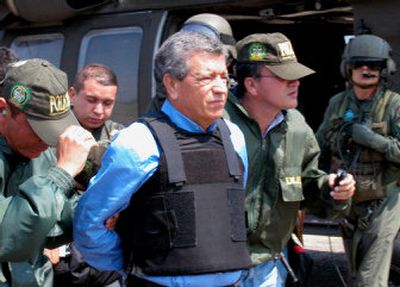Cali cartel founders plead guilty to U.S. drug charges

MIAMI – In what the government called “the final, fatal blow” to the world’s biggest cocaine supplier, two Colombian brothers who helped found the infamous Cali cartel pleaded guilty Tuesday to drug trafficking, agreed to forfeit billions in tainted assets, and received what could amount to a life sentence.
Gilberto and Miguel Rodriguez Orejuela, ages 67 and 63, were each sentenced to 30 years in prison. They were the highest-ranking of more than 300 drug traffickers extradited to this country since the United States and Colombia signed a new treaty in 1997.
The brothers also struck a deal with prosecutors to protect six of their relatives in Colombia from prosecution on obstruction and money laundering charges. Twenty-eight family members will be permitted to keep some assets not tainted by drug money and could be removed from a Treasury Department list that has kept their property and bank accounts frozen since 1995.
“They sacrificed themselves for their family,” said David O. Markus, attorney for Gilberto Rodriguez Orejuela.
The Cali cartel, once responsible for as much as 80 percent of the cocaine brought into the United States, was known for its ingenious smuggling methods: hiding the drug in such things as hollowed-out lumber, cylinders of chlorine, even shipments of frozen broccoli and okra.
The brothers’ pleas “effectively signal the final, fatal blow to the powerful Cali cartel,” Attorney General Alberto Gonzales said in Washington. “This is a day of pride for the people of Colombia and for international law enforcement.”
Miguel was known as “The Master” for his inventiveness in finding ways to hide drugs. Gilberto’s nickname was “The Chess Player” for his role as the cartel’s strategic thinker. Their family invested in dozens of legitimate businesses around the world, including a Colombian discount drugstore chain with more than 400 stores.
In court, Miguel Rodriguez Orejuela issued an apology “to the people of the United States and to all individuals in authority. I am doing this from the bottom of my heart.”
The brothers agreed to forfeit to the United States $2.1 billion in assets linked to drug trafficking, but the two probably made many times that amount during the cartel’s heyday in the 1990s. Neither brother is required to cooperate in any current or future criminal investigations, according to the plea agreement.
The Miami attorney for the family members, Marc Seitles, said the deal would allow the relatives to escape the cartel’s shadow.
The Cali cartel became the world’s leading cocaine smuggling ring after eclipsing the rival Medellin cartel, which fell apart when several top members were arrested and its kingpin Pablo Escobar was killed in a 1993 shootout with Colombian police.
The brothers were convicted in Colombia of drug charges in 1995 but were indicted in 2003 in Miami on charges they continued to run their cocaine empire from behind bars. Gilberto Rodriguez Orejuela was extradited in 2004 and Miguel Rodriguez Orejuela in 2005.
In March, William Rodriguez Abadia, Miguel’s son, agreed to forfeit about $300 million in worldwide assets after pleading guilty to U.S. charges and agreeing to testify against his father and uncle.
The Cali cartel is estimated to have smuggled more than 250 tons of cocaine into the United States since the 1970s.
Colombia continues to provide some 80 percent of the world’s cocaine. Despite record eradication and extradition numbers, the supply continues to be robust, and the traffickers are said to include right-wing paramilitary chiefs and leftist rebels.